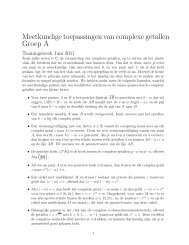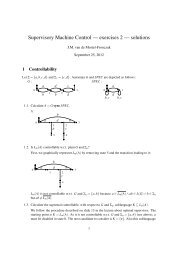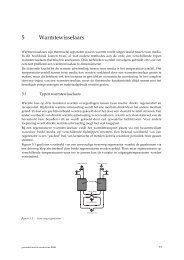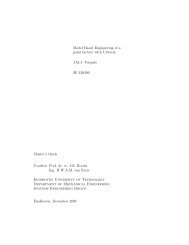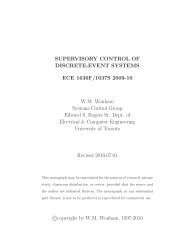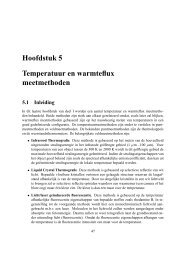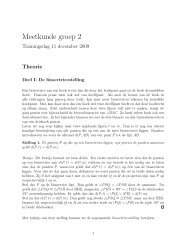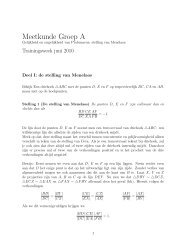Task states and Scheduling
Task states and Scheduling
Task states and Scheduling
Create successful ePaper yourself
Turn your PDF publications into a flip-book with our unique Google optimized e-Paper software.
<strong>Task</strong>s<br />
Rux<strong>and</strong>ra Bobiti<br />
Royce Luo<br />
George Rascanu<br />
Alex<strong>and</strong>ru Pustianu<br />
Tsvetan Baliovsky
Topics<br />
• <strong>Task</strong> definition<br />
• <strong>Task</strong> <strong>states</strong> <strong>and</strong> scheduling<br />
• Typical task operations<br />
• Typical task structure<br />
• <strong>Task</strong> coordination <strong>and</strong> concurrency<br />
• <strong>Task</strong>s in ROS<br />
/ name of department 13-5-2012 PAGE 1
<strong>Task</strong> definition<br />
• Independent thread of execution<br />
• Main property – schedulable<br />
• Defined by:<br />
• Supporting data structures (<strong>Task</strong> stack, TCB, task<br />
routine)<br />
• Set of parameters (Name, ID, <strong>Task</strong> priority)<br />
/ name of department 13-5-2012 PAGE 2
<strong>Task</strong> object<br />
/ name of department 13-5-2012 PAGE 3
System tasks<br />
‣Initialization/startup task<br />
‣Idle task<br />
‣Logging task<br />
‣Exception-h<strong>and</strong>ling task<br />
‣Debug agent tasks<br />
• Reserved priority levels for system tasks.<br />
/ name of department 13-5-2012 PAGE 4
<strong>Task</strong> <strong>states</strong> <strong>and</strong> <strong>Scheduling</strong><br />
• Ready state<br />
• Blocked state<br />
• Running state<br />
Ready state<br />
Pended state<br />
Delayed state<br />
Running state<br />
Suspended state<br />
/ name of department 13-5-2012 PAGE 5
<strong>Task</strong> <strong>states</strong> <strong>and</strong> <strong>Scheduling</strong><br />
/ name of department 13-5-2012 PAGE 6
<strong>Task</strong> <strong>states</strong> <strong>and</strong> <strong>Scheduling</strong><br />
State of <strong>Task</strong>-Ready list<br />
<strong>Task</strong> 1<br />
Priority=70<br />
<strong>Task</strong> 2<br />
Priority=80<br />
<strong>Task</strong> 3<br />
Priority=80<br />
<strong>Task</strong> 4<br />
Priority=80<br />
<strong>Task</strong> 5<br />
Priority=90<br />
<strong>Task</strong> 1 executed<br />
<strong>Task</strong> 2<br />
Priority=80<br />
<strong>Task</strong> 3<br />
Priority=80<br />
<strong>Task</strong> 4<br />
Priority=80<br />
<strong>Task</strong> 5<br />
Priority=90<br />
<strong>Task</strong> 1 blocked, <strong>Task</strong> 2 executed<br />
<strong>Task</strong> 3<br />
Priority=80<br />
<strong>Task</strong> 4<br />
Priority=80<br />
<strong>Task</strong> 5<br />
Priority=90<br />
<strong>Task</strong> 2 blocked, <strong>Task</strong> executed<br />
<strong>Task</strong> 4<br />
Priority=80<br />
<strong>Task</strong> 5<br />
Priority=90<br />
<strong>Task</strong> 2 unblocked<br />
<strong>Task</strong> 4<br />
Priority=80<br />
<strong>Task</strong> 2<br />
Priority=80<br />
<strong>Task</strong> 5<br />
Priority=90<br />
<strong>Task</strong> 1 unblocked<br />
<strong>Task</strong> 4<br />
Priority=80<br />
<strong>Task</strong> 2<br />
Priority=80<br />
<strong>Task</strong> 3<br />
Priority=80<br />
<strong>Task</strong> 5<br />
Priority=90<br />
/ name of department 13-5-2012 PAGE 7
<strong>Task</strong> blocked<br />
• A call to request an unavailable resource<br />
• A call to request to wait for an event to occur<br />
• A call to delay the task<br />
/ name of department 13-5-2012 PAGE 8
<strong>Task</strong> unblocked<br />
• A semaphore token<br />
• A waiting message arrives<br />
• A time delay imposed<br />
/ name of department 13-5-2012 PAGE 9
<strong>Task</strong> Creation <strong>and</strong> Deletion<br />
• Fundamental operations:<br />
• Create<br />
Why<br />
‣Useful for debugging.<br />
‣Special initialization needs to occur between the<br />
times that a task is created <strong>and</strong> started.<br />
/ name of department 13-5-2012 PAGE 10
Fundamental operations:<br />
• Delete<br />
Why<br />
‣ Limited memory !<br />
Be careful!<br />
‣ Deleting one task can result in memory or resources leaks.<br />
/ name of department 13-5-2012 PAGE 11
<strong>Task</strong> <strong>Scheduling</strong><br />
• done automatic by the kernel<br />
• manual scheduling for developers using an API<br />
Why we need task scheduling <br />
Debugging <strong>and</strong> avoiding deadlocks or starvation in the scheduler<br />
• Fundamental operations:<br />
‣ Suspend<br />
‣ Resume<br />
‣ Delay<br />
‣ Restart<br />
‣ Get priority<br />
‣ Set priority<br />
‣ Preemption lock<br />
‣ Preemption unlock<br />
/ name of department 13-5-2012 PAGE 12
Obtaining <strong>Task</strong> information<br />
Information useful for debugging <strong>and</strong> monitoring<br />
• Get ID<br />
- Get the current task s ID<br />
• Get TCB - Get the current task s TCB<br />
/ name of department 13-5-2012 PAGE 13
Typical <strong>Task</strong> Structure<br />
• run to completion<br />
• endless loop.<br />
/ name of department 13-5-2012 PAGE 14
Run-to-Completion <strong>Task</strong>s<br />
RunToCompletion<strong>Task</strong> ()<br />
{<br />
Initialize application<br />
Create endless loop tasks'<br />
Create kernel objects<br />
Delete or suspend this task<br />
}<br />
/ name of department 13-5-2012 PAGE 15
Endless-Loop <strong>Task</strong>s<br />
EndlessLoop<strong>Task</strong> ()<br />
{<br />
Initialization code<br />
Loop Forever<br />
{<br />
Body of loop<br />
Make one or more blocking calls<br />
}<br />
}<br />
/ name of department 13-5-2012 PAGE 16
<strong>Task</strong> implementation in ROS<br />
• Nodes- processes that perform computation<br />
• Defining a node <strong>and</strong> communication<br />
• Peer-to-peer communication<br />
• One-to-one<br />
• One-to-many<br />
• Many-to-many<br />
• Request-reply<br />
• Request-reply with feedback<br />
• <strong>Scheduling</strong><br />
• Possibilities for real-time control<br />
• Node operations<br />
/ name of department 13-5-2012 PAGE 17
Defining a node<br />
/ name of department 13-5-2012 PAGE 18
Request-reply communication<br />
• A way for synchronous communication<br />
/ name of department 13-5-2012 PAGE 19
Preemptible Request-reply<br />
• For time consuming services<br />
• Allows preemption of required services->Preemption results in cancellation of<br />
the previous goal<br />
• Provides feedback of the current status <strong>and</strong> results<br />
/ name of department 13-5-2012 PAGE 20
Benefits of the peer-to-peer<br />
• In distributed systems<br />
802.11x<br />
Offboard computation<br />
Onboard computation<br />
/ name of department 13-5-2012 PAGE 21
Real-time possibilites<br />
• PR2 Controller manager<br />
• Hard real-time loop at 1000Hz<br />
• Calls <strong>and</strong> schedules controllers<br />
/ name of department 13-5-2012 PAGE 22



